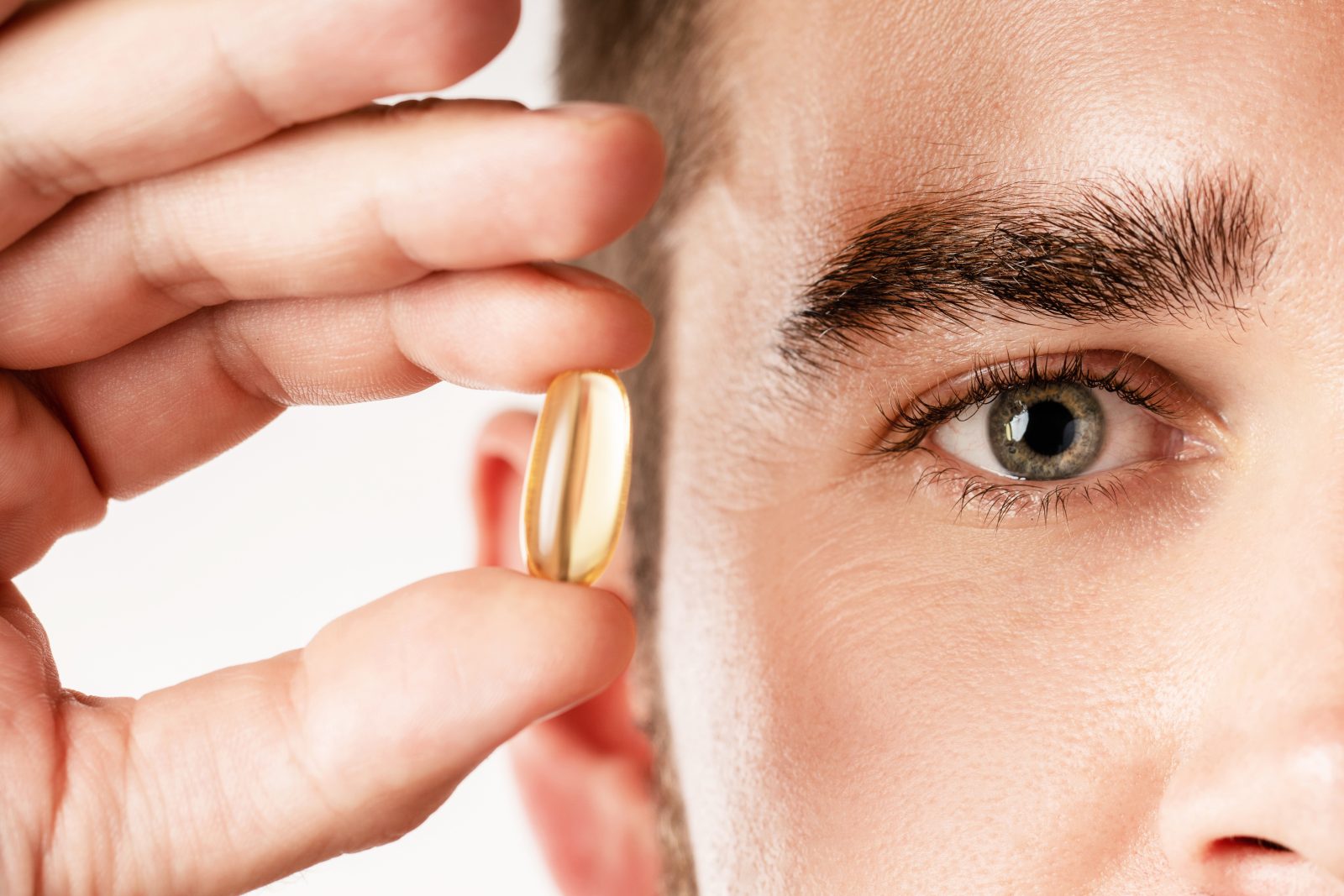Fish oil can benefit men’s health, improving memory and heart health. Learn about how fish oil supports men’s well-being and the safest approach to its consumption.
When you start seeing posts about the benefits of fish oil for men on your social media, you know the supplement has made its way into popular discussions. But does it live up to all the attention?
“Fish oil has been hailed for its potential health advantages, but it remains uncertain whether the hype is justified,” explains Kim Yawitz, RD, a registered dietitian based in St. Louis, MO. “We understand that it’s a rich source of omega-3 fatty acids, and evidence suggests that individuals with higher omega-3 levels might enjoy improved heart and brain health.” Yet, she notes, it’s unclear whether these benefits are linked to fish oil supplements specifically or if they arise from the overall health-conscious habits of those who take them (like those who consume a lot of seafood or follow a Mediterranean diet).
In the sections below, discover what you need to know about the potential advantages of fish oil, whether you should consider supplementing with it, and any possible side effects.
What Is Fish Oil?
Before delving into the omega-3 fish oil benefits for men, you might wonder about the nature of fish oil. According to Yawitz, fish oil is extracted from the solid and liquid fats present in the tissues of fatty fish such as anchovies, herring, mackerel, salmon, tuna, and more.
Fish oil is a rich source of DHA and EPA, not directly from the fish themselves, but from microalgae lower in the food chain,” she explains. These essential omega-3s accumulate in fish’s fat and liver as they consume smaller organisms like phytoplankton. Later, these are extracted to create fish oil supplements. Nevertheless, Yawitz emphasizes that the most reliable way to ensure sufficient DHA and EPA intake is by consuming around eight ounces of fatty fish weekly, such as those mentioned earlier. (You can also explore the top 10 fish choices for protein.) However, supplements can be a nutritional aid if something other than seafood is a regular part of your diet.
The advantages of fish oil stem from its omega-3 fatty acids, according to Molly Snyder, RDN, LDN, and owner of Full-Filled Nutrition in Pennsylvania. She explains that omega-3s play a crucial role in maintaining the health of cell membranes health. These fatty acids exhibit anti-inflammatory properties that positively impact various aspects of the body.
Omega-3 fatty acids belong to a category of polyunsaturated fats that contribute to the composition of cell membranes. They not only provide energy to the body but also help regulate inflammation. The benefits of omega-3 fish oil extend to muscle function, cell development, memory enhancement, brain activity, and heart well-being.
There are three main types of omega-3 fatty acids:
- Alpha-linolenic acid (ALA)
- Eicosapentaenoic acid (EPA)
- Docosahexaenoic acid (DHA)
“ALA is primarily found in plant-based foods and plant oils, such as flaxseed, nuts, legumes, soybean, and canola oils. DHA and EPA are present in fish and seafood sources,” she explains.
Safe Methods for Taking Fish Oil Supplements
Since the FDA does not regulate Omega-3 fish oil supplements, the information provided on the supplement label might need to be more accurate, warns Catherine Karnatz, MPH, RD, a dietitian based in Rhode Island and the founder of Nutrition Education RD. She suggests adopting a food-oriented approach to gain the nutritional advantages of omega-3 fatty acids from fish oil. Nonetheless, if you’re considering supplementing your diet with fish oil, here’s a reliable way.
Fish Oil Dosage
While there isn’t an official daily recommendation for optimal fish oil benefits in men, Yawitz advises, “I usually suggest about 1,000mg of combined DHA and EPA per day for clients who don’t consume fish.”
Yawitz points out that the levels of DHA and EPA can differ depending on the fish species. Many commonly eaten fish contain between 1,000 and 2,500mg of DHA and EPA per 3.5-ounce serving. For instance, a 3.5-ounce serving of mackerel supplies approximately 2.5 grams of DHA and EPA, while pink salmon offers about 1,000mg of DHA and EPA in the same serving size.
“Lower doses might not sufficiently elevate omega-3 levels to reduce the risk of chronic conditions, and higher doses increase the chance of adverse effects.”
The concentration of DHA and EPA
When evaluating omega-3 fish oil supplement labels, focus on the nutrient breakdown, as a “1,000mg fish oil supplement may only contain 200 to 300mg of DHA and EPA,” cautions Yawitz, due to brand variations. Aim for 500mg of each nutrient.
Consult Your Healthcare Provider
Before introducing fish oil supplements into your routine, it’s essential to “speak with a medical professional,” emphasizes Karnatz. The nutritional content can differ significantly from one brand to another. If you choose to incorporate fish oil after obtaining approval from a qualified healthcare expert, Karnatz suggests selecting brands that have undergone third-party testing and are NSF certified. This ensures you’re consuming precisely what is indicated on the supplement’s packaging.
Understanding the Risks and Side Effects of Fish Oil
Fish oil supplements typically contain around 1,000mg to 1,500mg of fish oil in each serving. If you follow the dosage instructions provided on the label, you will likely remain within a safe range of fish oil consumption. According to Yawitz, “healthy adults can safely take up to 5,000mg of combined DHA plus EPA daily.” However, higher doses can lead to side effects like nausea, fish-flavored burps, diarrhea, and headaches.
For some individuals, the discomfort of experiencing a fishy aftertaste from a burp might deter them from continuing with fish oil supplements. Trying different brands could help alleviate this issue. Additionally, algae-based vegan omega-3 supplements are now available, which may have a milder aftertaste.
According to Yawitz, “Omega-3s can interact with certain medications like anticoagulants, blood pressure drugs, and vitamin E.” It’s important to discuss this with your doctor before changing your supplement routine or introducing new supplements.
Additionally, if you’ve undergone surgery before, you might recall your doctor advising you to discontinue omega-3 supplements a few days before the procedure temporarily. Yawitz explains, “Omega-3s have a blood-thinning effect, which can increase the risk of heavy bleeding.” This risk is more significant with larger doses and could lead to spontaneous bleeding from the gums and nose.
Fish Oil and Brain Health
An impressive advantage of fish oil, beneficial for both men and women, is its potential to support brain health. For individuals aged 65 and above, research indicates that supplementing with omega-3 fatty acids could enhance cognitive performance, according to Snyder. However, something else is needed to equate to a magic solution. If you’re a healthy 25-year-old male and start taking fish oil now, it might not necessarily directly impact your future cognitive function.
Considering this, some evidence suggests that DHA and EPA could play a role in safeguarding against memory loss, Alzheimer’s disease, and dementia, as mentioned by Yawitz. It’s worth noting that “it’s unclear whether fish oil supplements provide the same benefits as consuming actual fish.” Therefore, for those who regularly include fatty fish in their diet, investing in supplements for potential omega-3 fish oil benefits might be optional.
Does Fish Oil Impact Sperm and Fertility?
A notable fish oil benefit for men that garners attention is its potential influence on sperm health. Yawitz explains, “Fish oil contains omega-3 fatty acids and vitamin A, both of which are associated with improved semen quality.” She refers to a 2020 study that discovered young, healthy men who took fish oil supplements had higher semen volume and larger testicles than those who didn’t. This difference was more pronounced among men who consistently took fish oil. Yawitz adds, “Men who regularly used fish oil also showed reduced levels of follicle-stimulating hormone and luteinizing hormone—two substances that, in excessive amounts, have been linked to testicular failure.”
Does Fish Oil Improve Stamina?
Regarding the fish oil benefits for men, whether supplements can enhance stamina remains uncertain, both in athletic performance and intimate situations.
“Many athletes turn to fish oil supplements based on anecdotal accounts suggesting they can reduce inflammation, aid recovery, and boost endurance,” explains Yawitz. However, she clarifies, “There’s limited evidence overall to support the idea that fish oil supplements significantly increase stamina.”
Does Fish Oil Promote Beard Growth?
If you aim to achieve a fuller beard, you might have contemplated trying fish oil vitamins. But is it worth it? “Fish oil might contribute to hair growth by potentially improving blood flow and delivering nutrients to hair follicles,” Yawitz suggests. She points out that studies have indicated adults taking fish oil experienced increased hair growth and reduced hair loss compared to those receiving a placebo. However, Yawitz emphasizes, “These studies haven’t specifically focused on beard growth, and most have involved women and rodents.” If enhancing beard growth is your primary goal with omega-3 fish oil supplementation, it might yield a different result.















Find Us on Socials